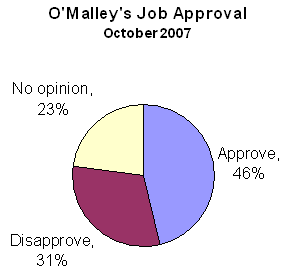 |
|||||
| Politics | Business | Schools | Justice | Health | Et Cetera |
By Bernie Becker The Gonzales Research and Marketing poll comes less than a week before the start of a special legislative session that will take up Gov. Martin O'Malley's plan to close a looming $1.7 billion budget shortfall, largely through new and higher taxes. "People are most concerned with their own personal pocketbooks," said Mark Plotkin, a political commentator at WTOP radio. "To them, the state shortfall is almost an academic matter." Gazette newspapers columnist Blair Lee noted that more poll respondents were concerned about taxes than the budget deficit, and that 61 percent of those who disapproved of O'Malley's performance did so because they disapproved of his tax plan. The governor's approval rating fell from 52 percent in March to 46 percent in the latest poll. "That suggests the governor has not convinced people there's an emergency," Lee said. The telephone survey of 839 registered voters found 40 percent think the state is moving in the wrong direction, a jump of 15 points since January, while 49 percent were satisfied with the state's direction, a drop of 12 points. "That's a dramatic shift," pollster Patrick Gonzales said of the findings. The poll, which was taken from Oct. 16-21, also found that 17 percent of respondents thought taxes were the most important issue in Maryland, an issue that is "often in the single digits," Gonzales said. But a spokesman for O'Malley noted that the same poll "overwhelmingly shows" support for most of the governor's tax proposals and his call for legalizing slot machines. The spokesman, Rick Abbruzzese, said the public's concern over taxes "also means they understand there's a structural deficit." He added that most poll respondents also approved of the upcoming special session. "Overall, the public supports" the governor's revenue package, Abbruzzese said. The governor barnstormed around the state last month to unveil a plan that included increases in the sales tax, corporate tax and income tax for the wealthiest in the state, as well as decreases in the property tax and income tax for most Marylanders. But Plotkin said the governor "hasn't sold the perception that 83 percent" of state residents will pay less in taxes, as O'Malley has claimed. The Gonzales poll found strong support for the corporate and income tax changes, but also broad opposition to the proposed sales tax increase. The penny sales tax increase, from 5 cents to 6 cents per dollar, is "not out of line with surrounding states," said Matthew Crenson, a political scientist at Johns Hopkins. But it "is completely foreign to Marylanders." Crenson added the public "will not take the deficit seriously until they see what it's going to cost them," such as "sharp cuts in education and aid to local governments." O'Malley this week began outlining the effects of rejecting his revenue package, predicting cuts in not only education and aid to the counties, but health care and public safety as well. But some observers think the governor may be pushing even Maryland's historically liberal electorate to the breaking point. "I was reading the doomsday budget yesterday," Lee said. "And a lot of those cuts made great sense." Rising taxes can convince the public "they're being plundered," said Richard Vatz, who specializes in political rhetoric at Towson University. "It reaches a point when, even in Maryland, the electorate says enough -- we have to cut spending." Still, other analysts believe O'Malley's footing is not that shaky as the legislature prepares to meet. The poll numbers, "quite frankly, are not that bad," Gonzales said, noting that independents approve of the governor's performance by close to a 2-1 margin. "There are very encouraging signs." The special session "is a big gamble," Plotkin said. "But I think he's confident he can pull it off."
|
||||||||
|
Copyright © 2007 University of Maryland Philip Merrill College of Journalism | ||||||||
| Politics | Business | Schools | Justice | Health | Et Cetera | |||
